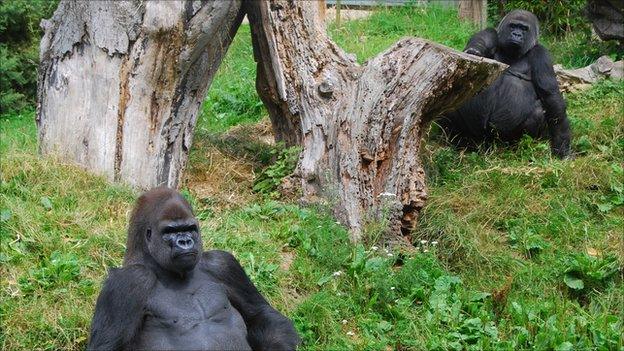Durrell wildlife park trains conservationists worldwide
- Published

Durrell Wildlife Conservation Trust works to preserve species around the world
The Durrell Wildlife Conservation Trust may have its headquarters in Trinity in Jersey, but its reach and influence spreads around the world.
Founded by Gerald Durrell in 1959, the Jersey Zoological Park was a sanctuary and breeding centre for endangered species.
And that is still the mission of the trust 52 years later, except now they are helping conservationists protect species around the world.
In 1978 Gerald Durrell created what he called a "mini-university" at the centre in Trinity.
Its aim was to "provide intensive training to conservation practitioners worldwide."
In 2011 that centre is still going strong, helping to train conservationists who come from all over the world to study.
Breeding programme
Every year they run an internationally-acclaimed endangered species management graduate course.
The trust is now running this year's course.
It takes place over twelve weeks and helps train conservationists to run projects in their own countries.
The dozen or so people taking part in the course annually receive training in the latest theory and practice of conservation biology along with field research techniques.
They are also given project management and leadership training.
But the help and influence does not end with the training.
Ramesh Chand, from Fiji, was a graduate of the course in 2010, and successfully applied for a small grant from Durrell to help with a breeding programme for the Monoriki Crested Iguana.
Mr Chand said: "Being selected to further my studies in the endangered species management was of tremendous benefit not only to me but to the endangered and very rare wildlife of Fiji."
Jamie Copsey, head of the international training centre, said: "We have now trained over 2,700 people from 128 countries.
"Through the network, our graduates are able to receive support from both Durrell and also from each other.
"We support our graduates with the opportunity to apply for a range of small grants, which enable them to start up conservation projects or further build their own capacity."
Durrell are now using the course as a tool to select promising candidates for further training, to help them to develop into conservation leaders of the future.
Many students are scientists from developing countries who are in a prime position to save animals from extinction.
- Published15 February 2011
- Published28 December 2010
- Published16 November 2010
- Published6 October 2010